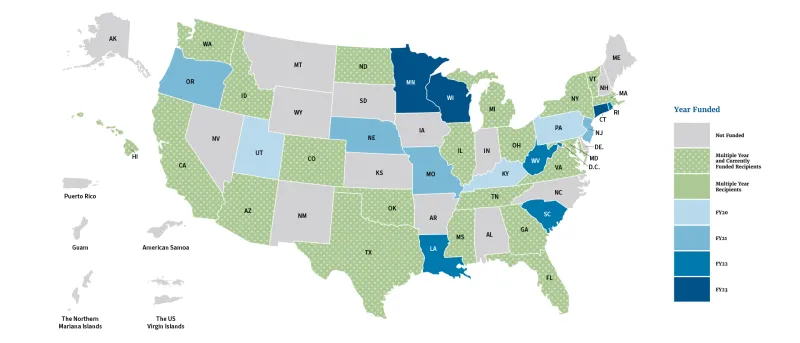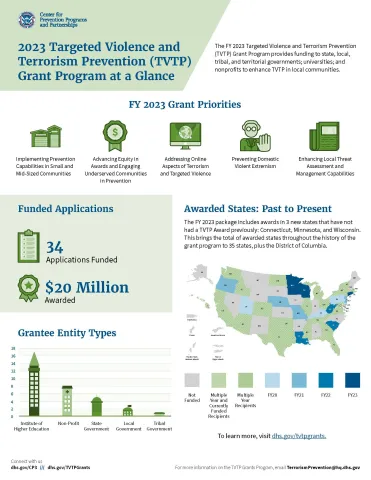The Targeted Violence and Terrorism Prevention (TVTP) Grant Program provides funding for state, local, tribal, and territorial governments; nonprofits; and institutions of higher education to establish or enhance capabilities to prevent targeted violence and terrorism. The Center for Prevention Programs and Partnerships (CP3) and the Federal Emergency Management Agency (FEMA) administer the program. It is the only federal grant program solely dedicated to helping local communities develop and strengthen their capabilities in this area.
The Fiscal Year 2024 (FY24) TVTP Grant Program application deadline was Friday, May 17, at 5 p.m. EDT. Thank you to all who applied. CP3 will announce the FY24 TVTP Grant Program recipients in September 2024. Questions can be directed to TerrorismPrevention@hq.dhs.gov.
Acts of targeted violence and terrorism are often preventable. The TVTP Grant Program provides financial assistance to develop sustainable, multidisciplinary prevention capabilities in local communities, pilot innovative prevention approaches, and identify prevention best practices that can be replicated in communities across the country. TVTP Grantees leverage an approach informed by public health research, by bringing together mental health providers, educators, faith leaders, public health and safety officials, social services, nonprofits, and others in communities across the country to help people who are on a pathway to violence before harm occurs.
TVTP grantees have successfully implemented prevention projects since FY20. In addition to developing sustainable prevention capabilities, the TVTP Grant Program's goals include sharing promising practices and lessons learned with prevention providers around the country. Prevention providers are encouraged to review our TVTP Grantee Results to develop or enhance their own programming.
Fiscal Year 2023 Grantee Map
Since the program's inception, CP3 has provided awards to programs in 35 states plus the District of Columbia. The following states received TVTP Grant Program funding since fiscal year 2020.

Privacy, Civil Rights, and Civil Liberties
CP3 ensures adequate protections for individuals’ privacy, civil rights, and civil liberties, as required under DHS legal authorities and DHS policy, as part of its mission and operations. Preventing targeted violence and terrorism requires the trust and voluntary involvement of all elements of society to be successful, and CP3 works to ensure that its programs include fundamental constitutional and legal protections. CP3 equips its partners to prevent targeted violence or terrorism in their own communities. As such, CP3 does not broadly collect information or participate in law enforcement investigations, intelligence collection, or other direct or indirect disruption of active threats. Additionally, CP3 does not engage in censorship or encourage or facilitate any censorship by its grant recipients. Government censorship of viewpoints not only infringes on individuals’ constitutional rights, but it is also an ineffective tactic to prevent targeted violence and terrorism.
Evaluation and Evidence
As part of its mission, CP3 prioritizes adding to the evidence base of targeted violence and terrorism prevention. The TVTP Grant Program was established with evaluation built in through a partnership with the DHS Science and Technology Directorate (S&T). Since FY20, CP3 and S&T have partnered to establish third-party evaluation of a subset of TVTP grant projects (~7 projects per cycle). CP3 publishes these evaluations when complete.
Applicant Support
CP3 is committed to supporting first-time applicants, particularly those representing underserved communities, and provides the following resources:
- Detailed Applicant Resources, with webinars, guidance documents, instructional videos, publications, how-to guides, and previously successful applications;
- Live webinar opportunities;
- Direct support from CP3 grants managers - email TerrorismPrevention@hq.dhs.gov with questions, to request a one-on-one virtual meeting, or to request a webinar for a group;
- Unsuccessful applicant feedback is offered to all applicants who do not receive an award. Many applicants who receive and implement this feedback are successful in subsequent years.
Stay in Touch with TVTP Grants
To receive updates from CP3, including when new TVTP Grant opportunities are posted, join the CP3 mailing list.
- Input and confirm your email address, verify you are a human, and agree to the privacy terms.
- Select “Center for Prevention Programs and Partnerships” under “About the Department,” as well as any other DHS topics of interest, and choose “Submit.” (Other questions are optional.)
- You will receive a confirmation email and will be on CP3’s list for updates, including key updates about the TVTP Grant Program.
On September 6, 2023, DHS announced the award of 34 grants, totaling $20 million, under the TVTP Grant Program for Fiscal Year 2023 (FY23). The TVTP Grant Program provides financial assistance to eligible applicants to develop sustainable, multidisciplinary targeted violence and terrorism prevention capabilities in local communities, to guide innovative prevention approaches, and to identify prevention best practices that can be implemented in communities across the country.
View our FY23 TVTP Grant Program infographic.

The FY23 TVTP Grant Program supports the following priorities:
- Implementing Prevention Capabilities in Small and Mid-Sized Communities
- Advancing Equity in Awards and Engaging Underserved Communities in Prevention
- Addressing Online Aspects of Targeted Violence and Terrorism
- Preventing Domestic Violent Extremism
- Enhancing Local Threat Assessment and Management Capabilities
FY23 TVTP Notice of Funding Opportunity (NOFO)
Please find abstracts of FY23 awardees here.
Read about other currently funded grantees and learn about the results of these programs.
Please find links to abstracts and TVTP grants by fiscal year below:



